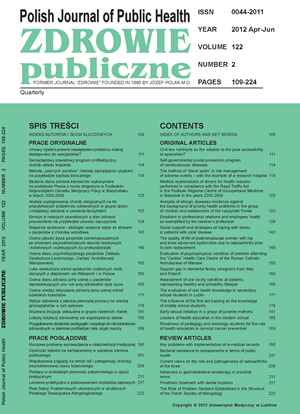Social support and strategies of coping with stress in patients with ulcer disease
Keywords:
stress, coping, social support, ulcer diseaseAbstract
Introduction. The etiology of ulcer disease has long been associated with psychogenic factors. After discovering the role of Helicobacter pylori in development of ulcers, the interest in psychosomatic aspects of this disease decreased. However, well controlled studies showed that various facets of psychological stress may still be important factors contributing to this disease, for instance through facilitation of H. pylori infection.
Aim. The objective of this study was to explore the role of two stress-related factors – perceived social support and strategies of coping with stress – in patients with ulcer
disease.
Material and methods. Sixty-two patients with ulcer disease and one hundred and two healthy controls took part in the study. They were assessed on a measure of coping with stress (Ways of Coping Questionnaire) and social support (Norbeck Social Support Questionnaire).
Results. The patients were found to report slightly higher levels of perceived social support than controls. Among coping strategies, patients differed significantly from controls in less frequent use of one coping strategy – cognitive restructuring. Social support was found to be related to certain coping strategies in the patients but not in the control group.
Conclusions. Higher levels of reported social support in patients with ulcer disease may be indicative of their greater need for this support due to the disease. Social support and coping strategies are related in patients with ulcer disease and these relationships are bidirectional.
References
1. Rymaszewska J, Dudek D. Zaburzenia psychiczne w chorobach somatycznych. Gdańsk: Via Medica; 2009.
2. Schindler BA, Ramchandani D. Psychologic factors associated with peptic ulcer disease. Med Clin North Am 1991;75(4):865-76.
3. Marcinkowska-Bachlińska M, Małecka-Panas E. Rola czynników psychologicznych w patogenezie chorób czynnościowych przewodu pokarmowego. Przew Lek. 2007;1:56-75.
4. Folkman S, Lazarus RS, Dunkel-Schetter C, DeLongis A, Gruen RJ. Dynamics of a stressful encounter: Cognitive appraisal, coping and encounter outcomes. J Pers Soc Psychol. 1986;50:992-1003.
5. Terelak JF. Człowiek i stres. Bydgoszcz-Warszawa: Oficyna Wydawnicza Branta; 2008.
6. Landowski J. Biologiczne mechanizmy stresu, In: A. Bilikiewicz, S. Pużyński, J. Rybakowski, P. Wciórka. Psychiatria. Wrocław: Urban&Partner; 2002.
7. Ogińska-Bulik N, Juczyński Z. Właściwości osobowości sprzyjające chorobom somatycznym – rola typu D. Psychoonkologia. 2008;12(1): 7-13.
8. Maciak A, Bryła M, Maniecka-Bryła I. Stres jako czynnik ryzyka choroby niedokrwiennej serca wśród uczestników Programu Profilaktyki i Wczesnego Wykrywania Chorób Układu Krążenia. Zdr Publ. 2010;120(4):337-40.
9. Sharma S, Ghosh, SN, Sharma M. Life Events Stress, Emotional Vital Signs and Peptic Ulcer. Psychological Studies. 2004;49(2-3):167-76.
10. Norbeck, JS, Lindsey AM, Carrieri VL. Further development of the Norbeck Social Support Questionnaire: Normative data and validity testing. Nursing Research. 1983;32:4-9.
11. Ell K. Social networks, social support and coping with serious illness: the family connection. Soc Sci Med. 1996;42:173-83. 12. Choung RS, Talley NJ. Epidemiology and clinical presentation of stress-related peptic damage and chronic peptic ulcer. Curr Mol Med. 2008;8(4):253-7. 13. Aoyama N, Shinoda Y, Matsushima Y, Shirasaka D, Kinoshita Y, Kasuga M, Chiba T. Helicobacter pylori-negative peptic ulcer in Japan: which contributes most to peptic ulcer development. Helicobacter pylori, NSAIDS or stress? J Gastroenterol. 2000;35(suppl. 12):33-7. 14. Sayers SL, Riegel B, Pawlowski S, Coyne JC, Samaha FF. Social support and self-care of patients with heart failure.Ann Behav Med. 2008;35(1):70-9. 15. Dunbar SB, Clark PC, Quinn C, Gary RA, Kaslow NJP. Family Influences on Heart Failure Self-care and Outcomes. J Cardiovasc Nurs. 2008;23:258-65.


